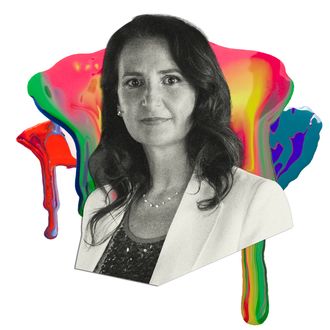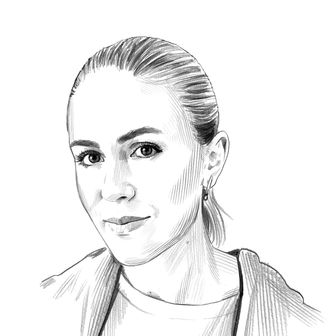
Ilaria Resta, the CEO of luxury Swiss watchmaker Audemars Piguet, is warm and friendly when she signs on to our Zoom call from her office in Le Brassus, Switzerland. She’s in no rush, happy to engage in casual chitchat before answering every nitty-gritty question about her daily routine. I’m surprised at first, considering she sits at the helm of a multibillion-dollar company with more than 2,000 employees. But Resta tells me relationship building is an essential part of her leadership strategy.
“Human connection is critical. It’s how I operate and how I get energized,” she says. “The most tangible measure of success is the impact you have on people. Definitely the impact on business is valuable, but the one you have on people stays in your heart.” Resta was born and raised in Napoli, Italy. She studied classical languages in hopes of becoming a professor before making a hard pivot to economics. She won a university-level marketing contest, which helped her secure a prestigious internship at Procter & Gamble. “That’s where my career in marketing started. Twenty-three years later, I found myself leading P&G’s business unit of beauty and hair care in the U.S.”
She held seven positions across three countries during her tenure at the company, eventually landing an SVP role at its headquarters in Cincinnati. After climbing the ranks for more than 20 years, Resta felt she had done all she could at the firm and was craving a new opportunity for growth. “If I don’t change jobs now, I never will,” she remembers thinking at the time.
Resta left Procter & Gamble in 2020 and accepted a new position as global president of perfumery at Firmenich, the largest privately owned fragrance and taste company in the world, before landing her most high-powered role to date one year ago.
On transitioning from beauty to luxury watches:
Well, first of all, I love change. I really believe changes in business — though the onboarding phase is very heavy — give you a sharp view for a limited time because you have to learn a lot and you start from zero. The best ideas pop up when you are not polluted by past knowledge or preconceived ideas. You will never be as sharp as you are at the beginning. So even though it was difficult and required a lot of studying, I found the transition intellectually interesting. Coming from a different industry gives you the ability to see things in a different way and add perspective. It gave me an edge in terms of creativity.
On celebrating professional wins:
I’ve never celebrated the big wins; I was already focused on the next one. It’s not in my nature to celebrate myself. I never feel a huge sense of accomplishment. But I feel a sense of happiness and belonging, which is frankly even more important. I celebrate promotions of the people I work with. If people on my team get promoted or find happiness at a different job that I could help them get, for me, that’s a great accomplishment.
On being both content and driven:
My kindergarten teacher used to tell my mom I would get stressed out because I couldn’t color inside the margins perfectly. I’ve always been extremely harsh on myself. As a businessperson, as a leader, you need to think about what could go wrong. You need to prepare the company for anything in order to protect your people. This is the reflex I have as a leader. But at the same time, I’m a naturally positive person. Internally, I’m constantly thinking about how to protect my team and the future of my company, but at the same time, I look around and I see so many reasons to smile. That’s the balance.
On the best advice she ever received:
Shut up, listen, and observe. When a thought comes to you during meditation, you’re supposed to see it, then let it pass; the same goes for ideas in the workplace. When you see your idea coming, it’s okay to let it go. I’m naturally so energetic. I never stop thinking or talking. But when I follow that advice, I learn so much more from the people around me.
On the worst advice she ever received:
I was once told to be more assertive and less emotional. It’s against my nature. In general, refrain from taking advice from anyone who tells you to become someone you’re not. It’s important to learn how to filter out bad advice.
On her daily commute to the office:
I have a wonderful one-hour drive through the mountains. I get to be in nature and have amazing views of Lake Geneva. And luckily enough, I don’t get much cell-phone service so I get to be totally present. That commute really helps me separate my work life from my home life.
On her morning routine:
I get to the office around 8:15 a.m. I leave the door open because the first half-hour is unplanned, no meetings. People come and go, we drink coffee and talk about tennis because I’m passionate about tennis and there’s always a tournament going on somewhere. Then my wonderful colleagues from the reception desk bring me my famous macchiato. I never drink it at home because I just love drinking it here with my colleagues. I also have yogurt for breakfast. That’s how I start my day.
On the importance of taking a (real) lunch break:
Most days are spent in back-to-back meetings, but I always make sure to eat lunch with someone. I hate eating by myself, and I don’t like to eat where I work. I think lunch should be a moment you share with other people, so that’s my ritual.
On working late nights and weekends:
My phone is always on, and people know they can reach me, even on the weekends. I need to be there for them if there’s an emergency. But I never call people myself unless it’s absolutely necessary. Every moment at the office is a chance to connect with colleagues, so I never do emails during the day. I do them at night, unfortunately. But that’s my choice so I can maximize my time with people in the office.
On her priorities:
The risk of my job is that my agenda fills up before I even wake up in the morning. I have to balance things that are urgent, important, and nice to have. When I choose my meetings, I’m extremely strict about making sure I know exactly what the purpose of each one is. I need to go in knowing exactly what I’m needed for and end with a better outcome than we started with. If no decisions are made during a meeting, it’s a waste of time. Long meetings are lazy meetings. I force short meetings because it helps people really nail down exactly what they want to accomplish.
On taking feedback:
I was born and raised to think feedback is a true gift — which doesn’t mean it’s always easy to hear, but it’s part of my way of working. It has nothing to do with a lack of confidence. Actually, it’s the opposite: I ask for feedback because I’m confident and want to do even better. I try to foster an environment that allows people to speak up freely because it’s very difficult for employees to come to me and say that I need to do something better. So my question to myself is always this: “Am I creating an environment that allows people to tell me that, or am I creating a bubble around me where I’m isolated from the truth?”
On the people who help her get it done:
I’m totally at the mercy of my wonderful executive assistant. Lots of people support me, actually, because my time is so tight and I’m not the best at organizing things. If it were up to me, I would make an appointment with five people at the same time. The concept of choosing is tough because I really want to do everything. I need someone to keep me on track.
On child care:
I have a nanny — now my kids are at the age where they get offended if I call her a nanny. But they have a helper who cooks and does chores I don’t have time to do. I’m extremely lucky because my husband has a job that allows him to work at home a lot and he doesn’t travel much, which allows me to do this job.
On work and motherhood:
When you become a mother, a percentage of your brain is constantly somewhere else. I personally had the typical sense of guilt when I was traveling, which I had to overcome, especially with the first child. After the birth of my second child, I learned that children survive your absence and actually they’re very good at it. I learned it was much more of a problem for me than it was for them. I learned to live with the compromises of not being there for them all the time. Everything I do is my choice; it’s not a sacrifice. If people see their life as constant sacrifices, they should make different choices.





